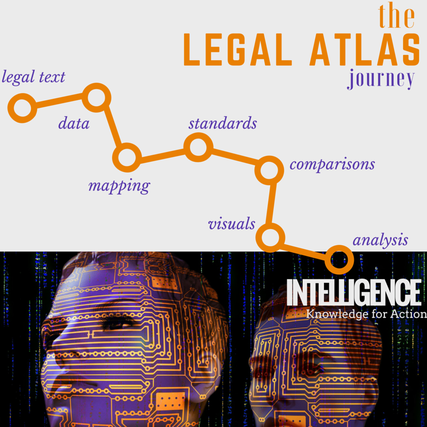 We keep using the term 'legal intelligence' at Legal Atlas to refer to our platform and the type of service we're providing. But of course most people aren't familiar with the practice of law, let alone what this term might mean. From what we can tell, it's also fairly new in the industry itself. When we first started using it about five years ago, searching for it on the web didn't result in many hits. Things have changed: the term is gaining a following and tracks with advances in information technologies that in turn are pushing innovations in the legal industry. Yet, the web... being the democracy of opinions that it is... hasn't spontaneously generated one agreed upon definition and, as we scan the landscape, it occurred to us that this will create a bit of confusion. To help our readers, and eventually users of our platform, we thought it would be useful to briefly describe the trends we see associated with this term and explain where we think we fit in and how we're different. There are many thousands of websites offering a variety of legal information services. What follows is just to give an introduction to a trend. We only cite one company in each example although we know of many more. We have not asked them if this is how they would characterize their use of the term. And we're not trying to promote anyone either. Use 1: as a market intelligence tool for the legal industryThis is probably the easiest use to distinguish from all the rest. Here the term is simply meant as a euphemism for being smart about the legal industry as a business, as opposed to smart about the law. In this case, legal intelligence is market intelligence. One example is ALM Legal Intelligence. They advertise themselves as "the trusted source of detailed legal industry business information, competitive intelligence and market data" they provide surveys about hourly billings, law firm rankings and more. Use 2: standard research and practice tools - augmented by technologyHere, legal intelligence refers to a more traditional set of legal information services that have been available in law libraries and now online, for some time, including access to annotated and searchable databases of laws, cases, comments, practices, etc. They are coupled with powerful search tools and in some cases include features that only digital platforms can offer; e.g., document drafting and review technologies. In these cases, legal intelligence seems to be principally about the use of technologies to save time and money when researching law in a single jurisdiction. LexisNexis UK is a good example here. They use the term to label a page called Lexis Legal Intelligence and advertise three tools including the LexisLibrary of annotated legislation, cases, forms, precedents and commentary; the LexisPSL which contains "practice-area specific guidance, checklists, precedents, forms, drafting notes, legal analysis and news"; and LexisSmart Bespoke a system that speeds the drafting of documents. Use 3: as a data analysis tool for case preparationThe third use of the term we found really marks the beginning of something new and different. The market is still the practicing attorney - so a traditional market in that sense. But this usage deliberately avoids the traditional libraries and focuses instead on technologies and services that turn data into useful information. The goal isn't just to save time, but to actually deliver information that the attorney might not otherwise see. Palantir's Legal Intelligence page is a good example of this. Focusing specifically on legal professionals, they advertise a system that can help lawyers "analyze all of the data related to a case in a single environment." Their argument is that attorneys are often overloaded with data of many different types that can complicate research. While legal texts are something they are well-equipped to handle, it's all the other data and the cross-referencing of that data to the law that causes the headache. LEGAL INTELLIGENCE for usThe Legal Atlas vision takes the last usage a step further, envisioning a support tool and catalyst for major social change on a global scale. In this, we are committed to the creation of knowledge that can foster positive action in the legal arena. We want to provide the tools that help us all build smarter laws for tomorrow's societies. We create legal intelligence by transforming vast amounts of static and obscure legal documents into a dynamic experience of understanding and learning. We take users on a journey from information to intelligence. You might compare 'information' in this sense to a jet engine taken to pieces. All parts are there, on the floor, but you need a sketch of how they fit to make sense of the mess. That is what 'law' is for most laymen: many 'fiddly bits' with no discernible use. We put the parts together, so that, one cog at a time, a full engine is created. We know that having access to the pieces will no more give you a jet engine than having access to legal documents will help you understand how they work. In our opinion, when it comes to law, the more people that understand it, the better. Our understanding of legal intelligence at Legal Atlas has some similarities to the examples in 2 and 3, and nothing from first use case. But our goal is different in all cases and so is at least part of our audience. While other offers are directed principally at legal practitioners, we are looking at everyone. This includes lawyers of course, but we are especially concerned about delivering solid, useful, actionable information to anyone from governments around the world, to journalists to NGOs, law schools, businesses and even high school students... Everything we do, and how we use the term legal intelligence, flows from this. Innovating in the organization of lawFirst and foremost, for us, legal intelligence is about understanding legal content in relation to the things we do or manage; not only how it relates to a single case. We think of law (all the pieces that make it up - laws, regulations, treaties, cases, etc.) as a management tool - public recipes that describe what rights we have, what needs to be done, by whom, when, where and, vitally, how.
Within any given topic, a variety of laws will likely apply that in a standard legal library would be separated into many different headings - to keep the analogy going - like jet engine parts scattered across the floor. A topic on women's rights, for example, might comprise a suite of laws, (more specifically only certain provisions from most laws), including the constitution, family law, inheritance, taxation, land tenure, health care, and more. Adding to the complexity are numerous implementing and interpretative documents - by-laws, ordinances, case law, etc. Topics thus become a focal point around which we organize 'law' (including all the less tidy bits) into a single group that otherwise belong to multiple legal subjects and jurisdictional levels to provide the most coherent picture possible of all legal instruments that affect the topic. Delivering an inter-jurisdictional understanding of common resourcesAlthough international treaties are supposed to help us manage things at this level, the reality is implementation and enforcement are still principally a function of national laws. Legal intelligence is therefore also about being able to access and compare similar legal content across borders, languages, and cultures to understand how national laws, and thus the management of a single thing (e.g., timber trade), change from place to place. This transforms the entire world's laws into a bouquet of case studies to learn from, aspire to or avoid: when it comes to implementation and enforcement, this experience shared is experience increased. Legal intelligence requires knowing what's related and how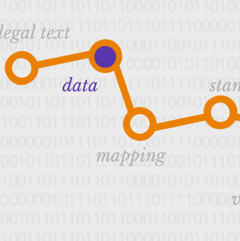 In this, we are probably most similar to Palantir in that we use information technologies to make it easy to see data from other sources as they relate to legal content. The difference is that we are not focused on a particular case and our data is not a form of evidence. Instead, it consists of all information, including spatial data, that we know is related to the topic being reviewed. Yet, crucially, this information is not presented as a mass of data: visual media is used to present it in context at each stage. For something like wildlife or timber trade, this might include the ability to search for a species in the law and at the same time see where it occurs on the map, its conservation status internationally and nationally, trade restrictions, volumes, values, as well as enforcement data. Maps to explore the spatial dimension of law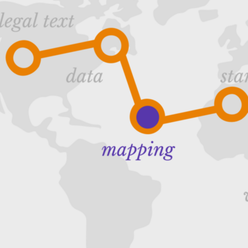 Related to the previous is the basic recognition that law is a place-based concept; that it applies within a particular jurisdiction and, in some instances, to specific people or resources within that jurisdiction. It not only can be mapped, but must be mapped if we have any hope of really understanding it. Maps, including map analytics, combined with legal content, are therefore another tool for legal intelligence. They tell us which people, which resources, and which landscapes are subject to which laws. The analytics can help us crunch the numbers in a variety of ways and view relationships that otherwise remain hidden. Maps also dramatically alter how we access law by allowing us to first search for the things and places we know and then see how the law relates - instead of first having to know the law - which, let's face it, most of us don't, including the experts. Who actually memorizes all that text, especially when it changes all the time? We stand firm when we say that we should not create law, and will certainly have a harder time understanding its impact, without a map. Visualizing the law gets us further, faster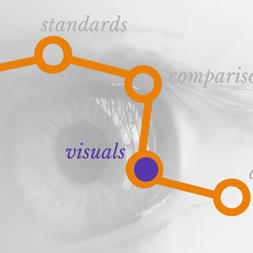 Ultimately, legal intelligence is about synthesis: the ability to process and act upon vast amounts of data as quickly as possible, and in a coherent manner. For this, there is simply no better tool than visualizations. We are visual creatures. The human brain processes visual information 60,000 times faster than text. Our goal is to deliver as much as possible in a visual format (without ignoring the value of written text and analyses) to help us see more quickly what we would probably ignore or never understand if it came to us only in written form. That said, we are not into things that just look pretty. If a visual isn't making it easier to access something or delivering useful, actionable information, what good is it? Author: James Wingard, JD Legal Director, Legal Atlas Contributors:
1 Comment
ioannis
27/12/2017 20:59:37
Exceptional.I am an economist specialized in agricultural and banking contracts and disputes.Working with a prominent lawyer in Athens Greece.We are intending of creating such a project like yours.It would be very correct from our side and kind from yours if we could find a way for a mutual cooperation in Greece.
Reply
Your comment will be posted after it is approved.
Leave a Reply. |
Legal Atlas BlogPosts about law, legal development, and legal intelligence. AuthorsRegular contributors to this blog include the staff and directors at Legal Atlas. Categories
All
Archives |



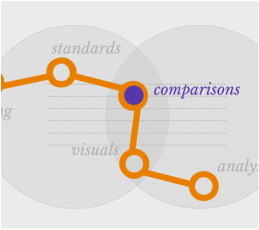
 RSS Feed
RSS Feed